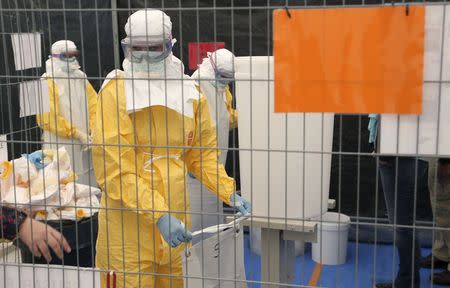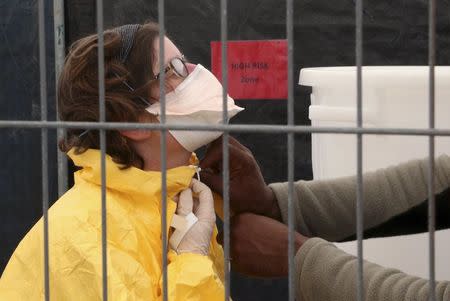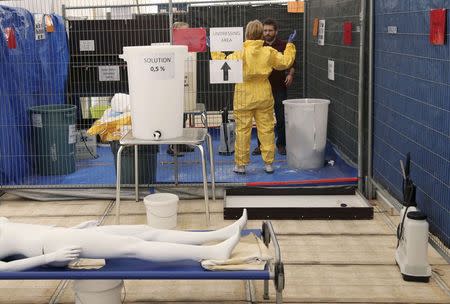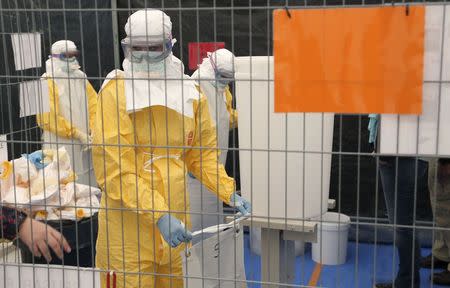Medical charity says has reached limit in fight against Ebola
By Robert-Jan Bartunek BRUSSELS (Reuters) - Medecins Sans Frontieres, a medical charity that has been at the forefront in the fight against Ebola in West Africa, said it was reaching its limit and urgently needed other organizations to step up the efforts against the deadly disease. The organization currently operates six centers in Guinea, Sierra Leone and Liberia, with a total of 600 beds. Its personnel on the ground have grown from about 650 at the start of August to about 3,000 currently. "We have increased our capacity a lot," said Brice de le Vingne, director of operations for MSF, which is also known as Doctors Without Borders. "Now we have reached our ceiling." De le Vingne called on other actors, such as governments and international organizations, to up their game. "They are deploying as we speak, but we still don't see the results on the field," he said. "The speed of the deployment is still lower than the speed of the epidemic, and that is problematic." The Ebola epidemic is still spreading, and projections show there could be 5,000 to 10,000 new cases a week in early December, the World Health Organization said on Tuesday. De le Vingne coordinates missions for MSF and oversees a facility in Brussels that trains volunteers heading for the affected areas. It is the only such training center in Europe, although others, operated by different organizations, are set to open in Geneva and Berlin. Medecins Sans Frontieres has been accumulating expertise in fighting Ebola outbreaks since 1995. Protocols have been developed on such crucial issues as disinfecting nurses and doctors after they've been in contact with the sick. At the Brussels training center, a group of trainees were being taught on Wednesday how to enter an Ebola field hospital and how to leave without infecting themselves. They learned how to carefully remove layer after layer of a thick protective suit, repeatedly washing their gloves in a chlorine solution. All the trainees, whether doctors, nurses or psychologists, have been on missions with MSF before. But working at an Ebola field hospital is particularly challenging. Already sweating under rubber aprons and face masks on a relatively chilly afternoon, they were reminded by the trainers that Africa will be much hotter, with temperatures at 30 degrees Celsius (86 degrees Fahrenheit) or more. "We limit the number of times that we suit up and go into that actual high-risk zone where the patients themselves are to just a couple of times a day, so as not to risk over-heating," said Paul Brockmann, one of the trainees who will head out to Sierra Leone on Friday. The psychological and physical stress is one of the reasons training missions are limited to about six weeks per turn, though some have gone on more than one turn. Even with the strict protocols, one of MSF's Norwegian staff members was diagnosed with the disease in early October. The organization said it was investigating the incident. "I'm a bit scared of what I will be seeing, because I know that there's a lot of human suffering that I will be witnessing, and I'm also scared for out staff," said Carla Uriarte a psychologist who is set to leave for Sierra Leone in November. "I know that some of our local staff died, not necessarily because they get infected in the center but because they are part of the community so that is the part that scares me the most." (Reporting by Robert-Jan Bartunek; Additional reporting by Miranda Alexander-Webber; Editing by Larry King)





